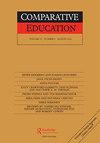非殖民化、语言和识字:与教师教育工作者的对话
IF 3.7
1区 教育学
Q1 EDUCATION & EDUCATIONAL RESEARCH
引用次数: 0
摘要
以西方主导的范式、规范、价值观和信仰来适应和繁荣。正如津巴布韦案例所说明和论证的那样,国际高等教育有必要去殖民化。更紧密的插入可能导致更深形式的采掘性新殖民。国际参与付出了真实而严重的代价,尤其是西方对技术的依赖,最近的COVID-19大流行进一步夸大了这一点。这些成本和风险需要更彻底、更关键的说明和评估。长期以来占据主导地位的现状是有充分理由的。对书中的内容进行更深入的比较批判性阅读,将给寻求设计自己的前进道路的政策制定者带来巨大的好处,这些道路涉及通过国际化进行的系统参与和协调。为什么在发展中的全球南方国家,这种广泛而持续的不参与发展中国家更深层次的国际化的现象依然存在?这是因为缺乏对可能性的认识、技术上的无能、缺乏政治意愿,还是一种深思熟虑的理性选择(一种持续脱钩的政策?),以避免感知到的风险,以及与西方接触的成本越来越高的现实?令人惊讶的是,这项工作几乎没有提及或报道通过扩大在线和虚拟电子学习实践以及早期被称为无国界或远程教育来进一步推动高等教育国际化的广泛工作。有一些提到和讨论了使用电子学习的个别机构的工作,例如,通过非洲虚拟大学的工作;南非大学和南部非洲发展联盟(SADC),但不是很多。最值得注意和最重要的是,这本书是在新冠肺炎之前出版的。因此,没有任何关于covid大流行的影响和影响。最后,对最近的女权主义、性别平等、后殖民或非殖民写作和批评的详细关注很少。注意到女性代表性不足,但很少有详细的暴露,讨论或对这方面的国际化的批判性分析。这项工作的一个优势在于,它提供了一个明确的信息——拯救之路是通过更好、更深入的国际化,让全球南方的民族国家更有效地融入世界体系,并将它们联系起来。它为工作和构建图像提供了一个基线。它的弱点在于它所缺乏的东西太多,以及它对占主导地位的正统观念的过度依赖。因为,正如我们所知,通往地狱的道路是由善意铺成的。本文章由计算机程序翻译,如有差异,请以英文原文为准。
Decoloniality, language and literacy: conversations with teacher educators
on dominant western paradigms, norms, values and beliefs to fit-in and prosper. There is a need to decolonise international higher education as the Zimbabwe case illustrates and argues. Closer insertion may result in deeper forms of extractive neo-colonisation. There have been real and severe costs of international engagement, not least for western technological dependency, which has been exaggerated recently by the COVID-19 pandemic. These costs and risks need a more thorough and critical elucidation and assessment. The status quo that has held sway for a long time has done so for good reasons. A deeper comparative critical reading of what is in the book would pay strong dividends to policymakers seeking to devise their own ways forward, regarding system engagement and alignment via internationalisation. Why does this extensive continued non-engagement with developing deeper internationalisation persist in the developing global south? Is it because of a lack of awareness of possibility, technical inability, lack of political will or is it a deliberate rational choice (a policy of continued delinking?) to avoid perceived risks and the reality of the increasingly high costs of western engagement? Surprisingly the work offers little reference to, or coverage of, the extensive work to further the internationalisation of higher education through expanding online and virtual e-learning practices and what was earlier known as Borderless or Distance Education. There is some mention and discussion of the work of individual institutions which use electronic learning e.g., via the work of, for example, the African Virtual University; the University of South Africa and the Southern African Development Consortium (SADC), but not much. Most noticeable and important, is the fact the book is pre-covid. Hence, there is nothing on the impact and implications of the covid pandemic. Finally, there is little detailed attention to more recent feminist, gender equity, postcolonial or decolonial writing and critique. The under-representation of women is noted, but there is little detailed exposé, discussion or critical analysis of this aspect of internationalisation. A strength of this work is that it provides a clear message – the road to salvation is through better and deeper internationalisation to insert and connect nation-states of the global south, more effectively into the world system. And it provides a baseline from which to work and build the picture. Its weakness is the plethora of what it absents, and its over-dependence on dominant orthodoxies. For, as we know, the road to hell is paved with good intentions.
求助全文
通过发布文献求助,成功后即可免费获取论文全文。
去求助
来源期刊

Comparative Education
EDUCATION & EDUCATIONAL RESEARCH-
CiteScore
7.40
自引率
21.20%
发文量
35
期刊介绍:
This international journal of educational studies presents up-to-date information with analyses of significant problems and trends throughout the world. Comparative Education engages with challenging theoretical and methodological issues - and also considers the implications of comparative studies for the formation and implementation of policies - not only in education but in social, national and international development. Thus it welcomes contributions from associated disciplines in the fields of government, management, sociology - and indeed technology and communications - as these affect educational research and policy decisions.
 求助内容:
求助内容: 应助结果提醒方式:
应助结果提醒方式:


